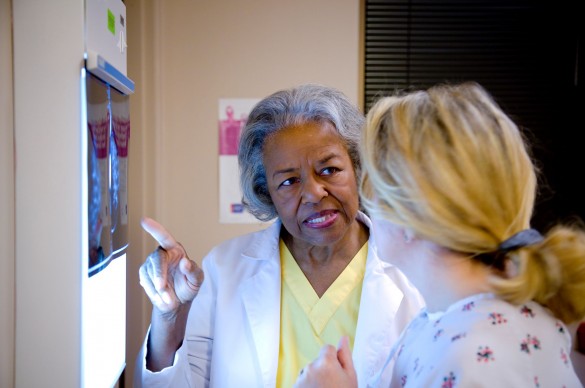For Americans who do not use tobacco, diet, weight and physical activity level are the leading risk factors for cancer. There is also growing evidence that a healthy weight, good nutrition and regular physical activity improve health outcomes and quality of life for those undergoing cancer treatment, and reduce the risk of recurrence for cancer survivors.
ACS CAN advocates for legislation and policies that promote healthy eating and active living. On Dec. 10, ACS CAN, the Academy of Nutrition and Dietetics (AND) and the International Health, Racquet and Sportsclub Association (IHRSA) hosted a policy seminar on nutrition and physical activity interventions for cancer survivors.
Michael Holtz, MS, APR, ACS CAN State Lead Ambassador for Tennessee, knows the importance of healthy eating and active living firsthand. As a stage-3b rectal cancer survivor, Michael is passionate about sharing the life lessons he's learned from that experience and the many half marathons, marathons and obstacle course races along the way. He blogs about life after cancer at http://www.michaelholtzonline.com/, and delivered the luncheon keynote to seminar attendees. Michael also graciously agreed to share his perspective here on Cancer CANdor.
For all of us, Healthy Eating and Active Living (HEAL) is important for optimal health. HEAL reduces our risk for cancer, diabetes, heart disease and other ailments. Plenty of research has been done to prove the importance of physical activity and eating nutritious foods like fruits, vegetables, and whole grains.
For cancer survivors, HEAL can reduce the severity of treatment side effects and the risk of recurrence. However, some of those same side effects and quality of life issues play a role in whether survivors can participate in physical activity.
All of this was the subject of discussion at a recent policy seminar on nutrition and physical activity interventions for cancer survivors sponsored by ACS CAN, the Academy of Nutrition and Dietetics (AND) and the International Health, Racquet and Sportsclub Association (IHRSA).
I had the privilege of sharing my journey as someone who lived a relatively healthy lifestyle before I was diagnosed with stage-3b rectal cancer, and the challenges I have trying to live a healthy lifestyle today.
In March 2012 I ran the Rock 'n Roll New Orleans Marathon, my fifth marathon. I'd lost 100 pounds, was in the best shape of my adult life and was wearing clothing sizes I hadn't seen since I was a sophomore in high school. Physically, I was on top of the world.
Three weeks later, all of that changed when I was diagnosed with cancer. Over the course of the next 11 months, I endured 55 days of oral chemotherapy, 28 radiation therapy sessions, surgery and 12 rounds of infused chemotherapy. I finished treatment on February 20, 2013, and was declared cancer free on May 3.
I remain cancer free, but I face quality of life issues every day. Cancer is at the root of them all, and collectively they make the active living part of HEAL challenging.
I gained back every one of those 100 pounds, almost all during chemotherapy. I was encouraged to eat whatever I could tolerate. Since the chemo didn't make me nauseated or vomit, I could tolerate almost anything. I was also severely fatigued, which made for a bad combination. Additionally, my metabolism doesn't work the way it used to. I run out of energy sooner than I did before cancer, and losing weight is more difficult now.
I also have neuropathy in my feet, a side effect of oxaliplatin, one of the drugs pumped into by body during chemo. Neuropathy means I can't feel the ground, and long-distance running or walking only aggravates the condition.
Surgery left me with a permanent colostomy. For some people, a colostomy is permission to spend the rest of their lives on the couch. They fear their appliances will leak or smell. I was lucky. My ostomy nurses told me the colostomy didn't have to hamper my active lifestyle. I could run, bike and swim with the thing, so I have. Yes, I've had leaks -- colossal appliance failures, in fact. I've learned to take them in stride.
Despite the challenges, I remain active. I ran a half-marathon four days after my diagnosis. I participated in a 10K obstacle course race less than three months after chemotherapy ended. I've done a half marathon, a marathon, several 5Ks and a Spartan Race. I have done countless boot camp work outs, been part owner of a gym, I run my own boot camp and I participate in a weekly workout we proudly call "Gutcheck." I'm also training for my second Spartan Race set for March.
I'm lucky in many respects. I have amazing support from my wife, dear friends and the people I work out with. I have a gym membership and the means to enter the races in which I train to compete. I also have access to grocery stores and farmers markets where my wife and I can buy healthy and nutritious food.
Many cancer survivors don't have the same level of support. Inequities exist in access to health care and health information, sidewalks, parks, grocery stores and farmers markets. Disparities in cancer diagnosis, mortality and survivorship exist among people of difference races and socioeconomic backgrounds. "Leisure time physical activity" and the time necessary to prepare nutritious meals is a luxury some survivors simply don't have.
Still, HEAL cannot just be the latest trendy public health acronym. Too many lives are at stake. Healthy eating and active living can reduce the risk of cancer for everyone and reduce the risk of cancer recurrence for survivors. We need to educate people at all levels: survivors, health care providers, insurers, community leaders and lawmakers.
The HEAL policy forum was the opening of an important dialogue. I expect we will learn much more about this important issue in the days, weeks and months to come.

